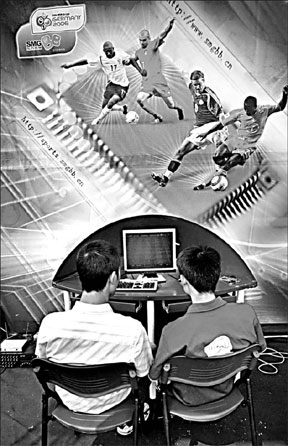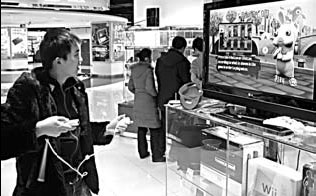Child's play no longer
Crouching down and springing onto her tiptoes, Zhang Li held the joystick steady as she played a virtual ski-jump game. The result soon flashed up - she broke her personal record again.
Usually around this time of year, Zhang would start to worry about her shape. Zhang says that she gains weight easily, and that she attended quite a few banquets during the Spring Festival.
The 26-year-old public relations officer believes that a slim figure will leave a good impression on her clients.
|
Two young gamers play an online football game. Yang Xi |
But Zhang is not a gym-goer as her busy job leaves her with little spare time. She bought a treadmill last year, but the expensive machine was soon deserted two months later - riding it was too monotonous.
Recently, Zhang found a new way to burn calories, stay at home, and have fun while losing weight.
Wii, Nintendo's next generation video game console, became Zhang's virtual gym. Connecting the white magic box to her TV, she could play all kinds of sports in her living room.
Two weeks ago, when her boyfriend bought the Wii and several sports games for 2,800 yuan ($394), Zhang, who never played video games before, complained about it.
But now she's hooked.
And as girls like Zhang are working out with the Wii, veteran gamers are hunting for higher quality gaming experiences.
Absorbed in latest sniper game, Shen hides in a virtual forest, picking enemies off one by one. The 37-year-old who asked not to give his full name works in a big hospital in Beijing. As a surgeon who finishes work around 10 pm most nights, Shen devotes his limited leisure time to two things: mountain climbing and video games.
His favorites are first person shooting and action games. He says they help him relax from his stressful job.
Shen's weapon of choice is a Play Station 3 (PS3): Sony's new generation console, which offers a high quality video game experience.
Last Saturday, Shen bought a PS3 for 3,300 yuan ($460) and a new shooting game for 600 yuan ($83). Shen thinks the price is reasonable, since the console can also function as a blue-ray DVD player.
This surgeon is further evidence that video games are no longer child's play.
Back in the early 1990s, Nintendo's first generation console FC (Family Computer), which offered Super Mario among its titles, introduced a new form of entertainment to China.
To see how big the video game business has grown in China, you only need to walk down Beijing's Zhongguancun and Gulou Streets.
Zhongguancun, known as the "Silicon Valley of China", is located in the capital's Haidian district. Global giants like Microsoft and Google have set up branches here.
But for most people, especially young consumers, Zhongguancun is less a research hub and more a giant digital products store.
Saturday afternoon is always the busiest time for Zhongguancun's popular digital outlets. There you can find piles of the most popular consoles including Sony's PS3, Microsoft's Xbox 360 and Nintendo's Wii.
"On average, we sell four sets of Wii per day and 50 PSP per week," says Zhen Wei, the 29-year-old manager of TG Bus, one of China's biggest domestic video game chain stores.
Every Saturday afternoon, Zhen spends most of his time running between the shop and the storeroom, fetching game consoles for his customers. He says that the Nintendo Wii and the PSP are most popular.
"In over 100 game shops in Zhongguancun, at least 2,000 PSP are sold per week."
A PSP, with all the bells and whistles such as earphones, case and a memory stick, will cost you about 1,800 yuan ($250). They're not cheap especially for young consumers. However, Zhen says that young gamers make up most of his customers.
"You may find many young commuters holding a PSP in the subway in Beijing, playing games, watching films or reading novels," Zhen says.
He also owned a PSP, which for him is the best way to kill time while riding the train.
According to Zhen, the structure of the gamer population has changed in the last 20 years. Today, adults and high-income earners are getting involved and many products now target adults.
Gulou (Drum and Bell Tower) is a unique attraction to tourists. Nearby the historic wonder, video game shops have opened on both sides of Gulou Street.
Zhao, who refrained from giving his full name, has been in the business for 15 years. When video games first came onto the scene, the 37-year-old opened his store to tap into the new fad.
He has hired three staff to meet the customers' needs, from demonstrating a new game to repairing old consoles.
|
A customer tries Wii at a video game store in Zhongguancun. Wang Ru |
"My regular customers like to share gaming experience with me, some of them have become my good friends," Zhao says.
"It is interesting to play the old familiar games with friends; it often reminds us of the joy which video games brought us and the happiness we shared together."
His 12-year-old son likes playing video games, but unlike most traditional parents, Zhao doesn't worry too much.
"Most parents believe playing video games may affect their children' schooling. I found that my son thinks more independently through playing video games," Zhao says.
According to International Data Group (IDG) which analyzes global markets, the video game console market in China will be worth $350 million by the end of 2010.
(China Daily 03/27/2008 page20)
















